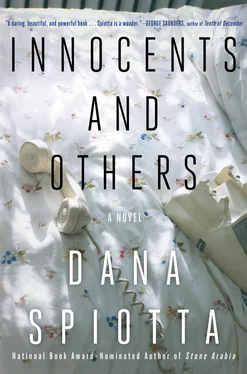Meadow’s mother had flown out and was there to drive her home. Meadow was weak and unable to take care of herself. She needed to stay in bed and rest for two weeks. So here she was, at thirty-five, being cared for by her mother. She did not mind this at all. Her mother, as beautiful and familiar a person as Meadow would ever see, brushed her hair from her face. Her mother brought her a tray of food. Her mother helped her sit up with pillows behind her back. Her mother brought her books and ice water. Her mother helped her to the bathroom, and then stroked her face gently before kissing her good night. Meadow gave in to it. She had no resistance to the love. She was helpless, and her mother helped her. But still Meadow stared into space as she tried to sleep, her eyes wide open in the dark, and she knew it was not good — her life, the world, the accident.
Kyle visited. Carrie called her. Meadow told them all she was fine, just sore. Her face looked bad where the plastic had stuck to her chin, but even that would heal quickly. The second time Carrie called, Meadow told her, “Do you know why people change when they are sick? They have time to think about where they are. And how little they have left.”
All of Meadow’s life she had prided herself on her rigorous self-interrogations. None of this saved her from becoming a destructive person, a person who not only didn’t make the world better, but a person who made some lives worse. She spent her last few days in bed taking inventory — wasn’t this how it worked in those recovery programs? She made herself write in a notebook about her transgressions big and small, as if the precision about the small ones might let her sneak up on the bigger ones.
Notes:
My Transgressions
I flirted, drunkenly and outrageously, with a friend’s husband. I remember touching his tie and looking into his eyes. The memory makes me flinch, though nothing came of it.
I did not return the letters of my aunt, who wrote in fine, even script of her admiration for my films. I meant to, but no.
I did not write to any of my teachers — not even Jay Hosney — to thank them for what they had taught me. Not once, though I think about it often. Gratitude unexpressed is no gratitude at all.
I cheated on the three serious boyfriends I have had, including Kyle. Some of it was discovered, but most of it wasn’t. I would sleep with men the way I have driven lately: not intentionally, veering into a sloppy collision, finding some way to inhabit myself as I lied and omitted and cheated. It meant nothing, yet I had to admit it meant a lot because I went to lengths to do it. Finding myself away from home, going out to a party where I knew no one, fixing my attention on one receptive person and not wavering until they were in a cab or an elevator. A hotel room was ideal: no one belonged there and it existed in a space separate from both our lives.
Not watching all of Carrie’s films, even though Carrie deserved better. Even though Carrie saw all of mine. Wishing, sometimes, that Carrie would not have success after success. Wanting, sometimes, people to fail. Not just people, but my friend.
Jelly in that fucking movie. That was the worst. I knew that Jelly would be humiliated. I put it in motion, and what for?
I lie all the time. To my parents, to my lovers, to my subjects, to myself.
I spend money. I have money from my parents, and I spend it on my art, my vanity. I gave a pittance to various causes related to my films, but that was all self-serving. All to show what a good person I am. All to mitigate the narcissism that was in evidence in everything I made.
I made
Meadow gave up. Her litany of self-recrimination was absurd. It did no one any good. Even her guilt and inventory were an exercise in narcissism. A way of proving that she was a certain kind of person. Part of her already saying, “Everyone behaves badly, but I am special because I admit it.” Meadow hurled the notebook off the bed and pushed her face into the pillow, which made her wince from the scab on her chin. She finally slept, and when sleep came it fell on her all at once, dreamless, long, and deep.
Meadow’s mother brought her juice and a white pill. Meadow took the tablet, put it on her tongue, and then the swallow of the juice. She looked up at her mother. Her mother said, “You need to eat something. Try some toast.” And Meadow picked up the piece of dry toast and bit into it. She chewed, looking at her mother and not speaking. She swallowed, which hurt a little.
“Good,” her mother said. Meadow took another bite and slowly chewed. She ate the toast.
“I think you need to take a shower. I will help you walk to the bathroom.”
Meadow swung her legs over the side. She was stiff and sore, and she needed her mother to keep her steady. She lasted only a few minutes in the shower before the hot water made her feel faint. Her mother held a towel around her and then helped her into a robe.
“Put your arm in here. Good,” she said. “Let’s brush our teeth before we go back to bed.”
Meadow brushed her teeth and looked expectantly at her mother.
“Back to bed and rest,” she said, and her mother helped Meadow walk back to bed. She helped swing her legs up one at a time and lie down. She pulled the sheet up and then the blanket. She turned out the light, kissed Meadow on the forehead. Meadow didn’t make lists or cry or throw anything. She thought of nothing at all except her mother saying, “Try to rest now.” And she did what she was told to do.
* * *
After her body healed and her mother had left, Meadow hoped she was different. She ate, she slept, she read the paper, she exercised. She had no idea what to do next. She moved through her old life with both deliberation and detachment, as though she were waiting for something to happen.
Money was complicated for everyone, but for Meadow it seemed that the older she got, the more uneasy her wealth made her feel. It had been Meadow’s habit — her whole life — to give money to people who asked her for money. People on street corners, a hand with paper cup held out or just a hand. The men standing by the streetlight or highway entrance ramp holding a piece of cardboard with a message written in Magic Marker: “I am a vet. Please help me. I have no place to live.” Sometimes a grubby teenage girl with piercings and a vacant look in her eye. “Excuse me, ma’am, can you help me get bus fare home?” A man on the subway or the bus with a ready-made speech that made everyone look away, or stare at the ground or the paper with steely absorption. The speech was always impossible, the weariness in the voice already making it seem rehearsed and insincere. She wanted them to stop, didn’t want them to perform their need. What difference did the speech make? You gave or you didn’t for whatever reasons, but not the speech. She pulled out some money as soon as they began.
Tiny, meaningless amounts of money, for which the person was always grateful and Meadow was always sheepish and embarrassed. The moment was always the same: she holds out the money and knows that she does not want to touch the person asking for money. So she forces herself to press it into the person’s hand, forces herself to make eye contact, smile, however fleetingly, lets her fingers brush the dirty rough fingers of the person. And in this moment she gets a glimpse of living on the streets, of dirty layers of clothes, of what skin must feel like unwashed for days and weeks at a time. And always Meadow feels shame. A shame that she must force herself to touch and see them, ashamed of how grateful they are, but mostly ashamed about how measly and self-gratifying the gesture is. She hates to do it: it is sentimental and self-serving and a sop to her guilt. To use another person’s need to make you feel as if you are good, even to use another person to remind you of your own luck and privilege — this is shameful.
Читать дальше












